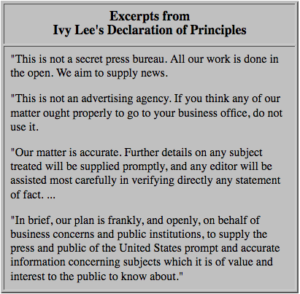Ivy Lee, an American public relations pioneer, left an indelible mark on the industry with his innovative approaches, particularly through the development of the Declaration of Principles.
This document not only broke new ground in the world of public relations but also set the stage for a more transparent and ethical relationship between businesses and the public.
In this article, we will explore Ivy Lee’s background, the significance of his Declaration of Principles, and its impact on the field of public relations.
Additionally, we’ll discuss the potential for ethical communication to be exploited and touch upon the connection with IG Farben.

Ivy Lee: A Brief Biography:
Ivy Lee, born in 1877 near Cedartown, Georgia, in Polk County, was an influential figure in the early days of public relations. With a background in journalism, Lee understood the power of media and communication.
He gained prominence for his work with major corporations, guiding them through challenging times and helping shape their public image.
Lee’s proactive and ethical approach to public relations set him apart in an era where corporate communication was often characterized by secrecy and manipulation.
Declaration of Principles:
Ivy Lee’s most enduring legacy lies in his creation of the Declaration of Principles, a groundbreaking document that aimed to redefine the relationship between businesses and the public.
This declaration, issued in 1906, outlined Lee’s core principles for ethical communication.
At its heart, the Declaration advocated for openness, honesty, and accuracy in dealings between corporations and the public.

Principles of the Declaration:
Openness and Honesty: Lee emphasized the importance of companies being open and honest in their communication. This marked a departure from traditional practices where corporations tended to be secretive about their operations.
Accuracy in Information: The Declaration stressed the need for accurate representation of facts. Lee believed that providing truthful and precise information would build trust between businesses and the public.
Timely Release of Information: Lee encouraged companies to be proactive in disseminating information. In the face of crises or challenges, he believed that addressing issues head-on and promptly was crucial in maintaining public trust.
Communication with the Public: The Declaration urged corporations to communicate directly with the public, bypassing traditional intermediaries like newspapers. Lee’s vision was to establish a direct channel of communication, fostering a more transparent relationship.
Impact on Public Relations:
The Declaration of Principles had a profound impact on the field of public relations. It marked a paradigm shift from the manipulative and secretive practices of the time.
Lee’s principles laid the foundation for modern public relations, emphasizing the importance of ethical conduct, transparency, and open communication.
The Exploitation Dilemma:
While Ivy Lee’s Declaration of Principles aimed to promote ethical communication, there is always the potential for such principles to be exploited.
In a world where information is a powerful tool, the line between ethical communication and manipulation can become blurry.
Unscrupulous individuals or organizations might use the guise of transparency to selectively present information, creating a distorted narrative.
The risk of exploitation is particularly evident in the age of digital media, where misinformation can spread rapidly. Everyone has a particular agenda, including even the most seemingly humble and virtuous.
It becomes crucial for companies to not only adopt ethical principles but also ensure they are implemented diligently.
Vigilance is required to prevent the misuse of these principles for deceptive purposes, although, let’s face it – human beings, by and large, are as self-serving and deceptive as they come.

IG Farben Connection:
It’s essential to acknowledge Ivy Lee’s association with IG Farben, a German chemical and pharmaceutical conglomerate.
During the 1930s, Lee provided public relations services to IG Farben, a company later implicated in war crimes during World War II.
This connection raises ethical questions about the responsibility of public relations professionals in choosing their clients.
While Lee’s work with IG Farben might be seen as a stain on his legacy, it also underscores the importance of ethical considerations in the practice of public relations.
Conclusion:
Ivy Lee’s Declaration of Principles stands as a testament to the enduring value of ethical communication in the realm of public relations.
His principles, rooted in transparency and honesty, have become guiding lights for PR professionals striving to build and maintain public trust.
However, as with any powerful tool, there is the potential for exploitation. It is incumbent upon practitioners to uphold the true spirit of these principles and guard against their misuse.
Ivy Lee’s legacy challenges us to navigate the delicate balance between openness and ethical responsibility in an ever-evolving media landscape.

No responses yet